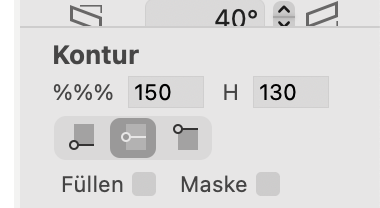I noticed some things in the German localisation of Glyphs in a screenshot of a another topic.
The translation of Compile (for feature code) is “verarbeiten” which would mean something like “to process something”, which at least to me is something different from compiling (“kompilieren”).
I would in any case fix the typo of “Versal Spationierung”, this is an increasingly common error seen everywhere. Nouns are hyphenated if not written together (It’s not Wasch Maschine, but Waschmaschine, always, no exception). So please update the translation to Versal-Spationierung. “Exportieren” also strikes me as odd, using the verb instead of the noun, which is inconsistent with the other titles (and the English equivalent Exports).
- I have no issues with Verarbeiten.
- Sometimes it can help legibility to not hyphenate and concatenate words, even when they are noun phrases. We may revisit some of them, but it does not bother me that much.
- Exportieren might just be because there is a single term for both the verb and noun in the English app and thus only one translated term. Some of these cases are fixed in future versions of Glyphs.
It’s simply incorrect, sorry, and very bad German. Nouns are never, ever split in German, no matter whether you find it looks nicer or not.
It is indeed a nice feature of (most prominently) English, where you can concatenate nouns with spaces (which does, in turn, sometimes make it somewhat confusing). Please remember hyphenation in German. Tut einfach weh, in Zeitungs Artikeln Wörter zu lesen, die aus mehreren Bau Steinen zusammengesetzt sind und dann einfach getrennt geschrieben werden. Dritte Klasse Deutsch Unterricht ![]()
Take a look at Finnish if you want to see concatenation that really is unübersichtlich.
At the end of the day language need to be clear and effective. If Standard Ligaturen is clearer at a glance than Standardligaturen and the word does not appear in a block of text but in a pice of UI, who’s to say that rules cannot be bend.
Maybe my issue stems from an incorrect understanding of what compiling means in the English version of Glyphs. Compiling entails an input and a result (thus a definitive beginning and end), processing (verarbeiten) is just an ongoing process (hence the term). This is why I find Verarbeiten to be inadequate, it is unclear what happens.
, then you use the other correct form, which is “Standard-Ligaturen”. That is how concatenation works in German. I don’t see how hyphenation makes things unclear.
A process can have a start and an end, no issue there. Again, some of these terms are already changed in future versions. And if I find time, then I would like to normalize a lot of German terminology in Glyphs. (Since German is probably the oldest localization, there are currently a number of inconsistencies.)
Sure it can, that’s the point. It’s unclear. Which is why compile is a great term, and verarbeiten an inadequate translation.
This reminds me of the same discussion surrounding Sharpen Corner, somewhat similar in the sense that sharpening implies a gradual process, an increase of the degree of sharpness. However, it is used in Glyphs to designate the very definitive process of making a corner from something that was not a corner beforehand. Suggestions would be Close or Make, those imply a definitive result. But this is again for another topic, sorry.
I think Sebastian is right. We need to work in the German transition.
I’m more than happy to help out (review/translate) if needed.
I agree with Sebastian’s point! Would also be willing to help out if needed.
There’s a translation string missing. Not sure if it’s just in the German version:
In the Stroke properties in the right-hand side panel, where there should be a “B” (Breite) there are three %%%

(Glyphs 3.2 (3179))
Fixed it.